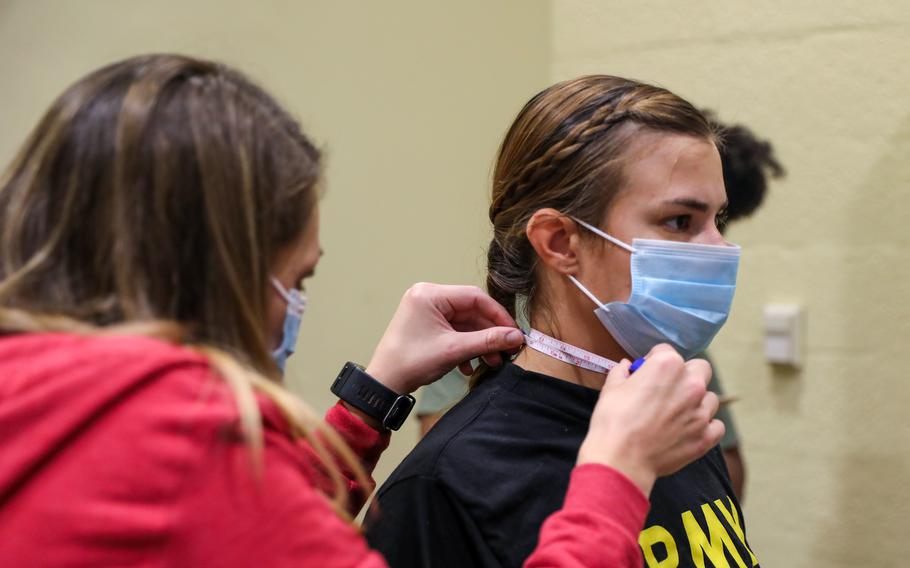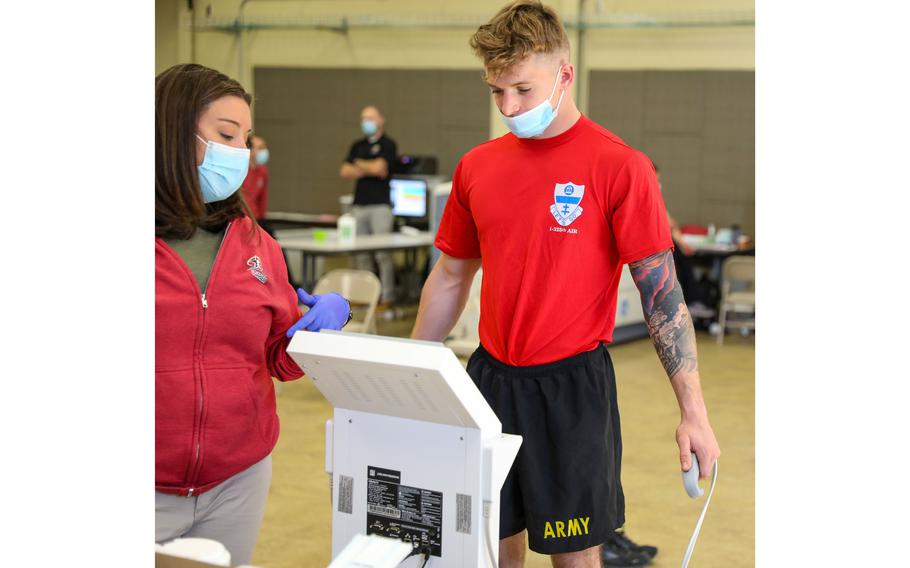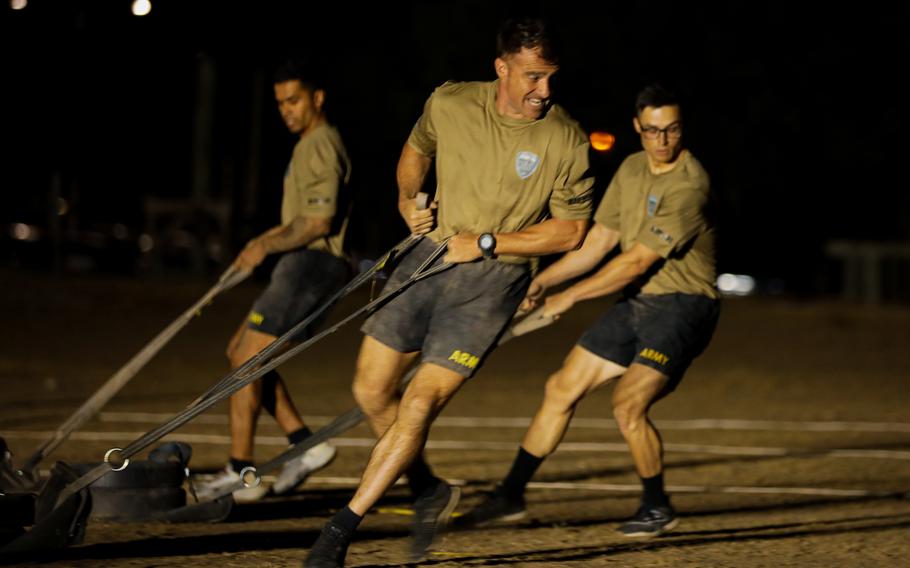
A soldier receives a standard tape test at Fort Bragg, N.C., in October 2021. (Lilliana Fraser/U.S. Army)
Soldiers who earn a high enough score on the Army’s fitness test will be exempt from body fat standards under a new policy that will go into effect immediately, Sgt. Maj. of the Army Michael Grinston announced Thursday.
Service officials said they believe those exemptions will help reduce the error rate of the Army’s body fat measurement method to almost zero.
Body fat is only measured on soldiers who fail to meet the service’s weight standards for their age and gender. The Army did not provide how many of its nearly 1 million active, National Guard and Reserve soldiers are failing the standard each year.
The policy change came from a body composition study that also recommended the service simplify its tape measure method for calculating body fat for those soldiers who exceed weight requirements. A second recommendation would allow for a biometric screening on approved devices to calculate body fat if the soldier fails after a tape test. Those two recommendations are still pending approval from the Army, Grinston said.
“Inside the force, there’s a lot of excitement about this,” he said during a call Wednesday with reporters.

A soldier receives a bioelectrical impedance analysis scan at Fort Bragg, N.C., in October 2021. (Lilliana Fraser/U.S. Army)
Under the new policy, soldiers who earn a 540 or higher on the Army Combat Fitness Test, with a minimum of 80 points in each of the six events, will not have to do a body fat test if they fail the weight requirements. The exemption is only valid for up to eight months for active-duty soldiers and 14 months in the National Guard and Reserve.
A passing score on the fitness test is 360 and a perfect score is 600. The study landed on a 540 because a soldier’s body fat, performance and injury-risk aligned for a fit healthy soldier at that score, said Holly McClung, one of lead researchers for the Army Body Composition Study.
Since the Army implemented its new fitness test in October, 240,377 active-duty soldiers have passing scores on file, according to the service. Of those, 23% met the new standard for exemption.
The test was first introduced in 2019 but implementation was delayed for years because of research that found women and members of the Guard and Reserve were unfairly assessed. Meant to simulate the physicality of combat, the six events of the test are a deadlift, standing power throw, hand-release pushups, the sprint-drag-carry, a plank and a two-mile run.
Grinston requested the Army Research Institute of Environmental Medicine conduct the study on body composition after hearing concerns from soldiers about the accuracy of the Army’s method for measuring body fat for overweight soldiers. The last Army study on the subject was 23 years ago, he said.
The current tape-test method, which the study found to be right about 65% of the time, includes taking measurements at a man’s abdomen and neck and a woman’s waist, hips and neck, and then calculating a specific equation. Soldiers told Grinston that their measurements weren’t always taken at the proper points of their body, he said.
However, almost all inaccuracies were in the soldier’s favor, according to the study, which collected data on 2,690 soldiers beginning in late 2021. Tape testing was passing about 35% men who should have failed and about 20% of women. In reverse, about 1% of men and about 5% of women were deemed overweight by the tape test when they should not have been. Failing weight requirements can impact a soldier’s career path or lead to discharges.
Women make up about 16% of the Army, the service said.
Grinston, who will retire in August, said he would like to see the other two proposals from the study put into policy before he leaves the Army. The first would equalize the tape-test for men and women with just one measurement taken at the bellybutton. It would also simplify the mathematical equation used to calculate body fat.
“From the outside looking in, [they] can see [they’re] going to be treated the same,” Grinston said. “From a leadership perspective, it's just going to be a lot easier.”
The second proposal allows for soldiers to use an approved biometric screening machine at a government facility to calculate their body fat if they fail a tape test. ROTC members would be allowed to use machines at their college.
The only approved method now for validating a failed tape test is another tape test.

Army Sgt. 1st Class Brandon Rodriguez, who was based at Fort Campbell, Ky., pulls a sled during the Army Combat Fitness Test as part of the U.S. Army Forces Command Best Squad Competition at Fort Hood, Texas, on Aug. 15, 2022. (Dylan Bailey/U.S. Army)
Approved machines include dual-energy X-ray absorptiometry, or DEXA, the In Body 770 bioelectrical impedance analysis machine, and the BOD POD, which is an air displacement plethysmograph.
The study also reviewed the tables for height, weight and age, and found them 90% accurate in screening for overweight soldiers. The Army decided not to make any changes to those tables, Grinston said.
Last year, the Defense Department updated its policy on body composition standards, giving the service branches more freedom to tailor weight and body fat requirements to their own troops and mission. The Air Force has adopted a similar tape test while the Marine Corps has done away with it altogether. Instead, it has purchased bioelectric analysis machines across the service to measure Marines who fail weight standards. It also waives weight requirements for Marines who score high enough on its fitness test.
The Navy announced last month that it would remove past fitness test failures from sailors’ records as the service tried to retain personnel. During the coronavirus pandemic, the Navy shifted to a single annual fitness test.
Grinston said it’s not feasible for the Army to implement a body-scan policy similar to the Marine Corps because the Army is a much larger force. It would be difficult for the Army to get machines out to all its National Guard and Reserve locations.
“We did our due diligence, and we didn't just rush to it,” Grinston said. “We want to get it right, and we want to do the soldiers feedback, too.”